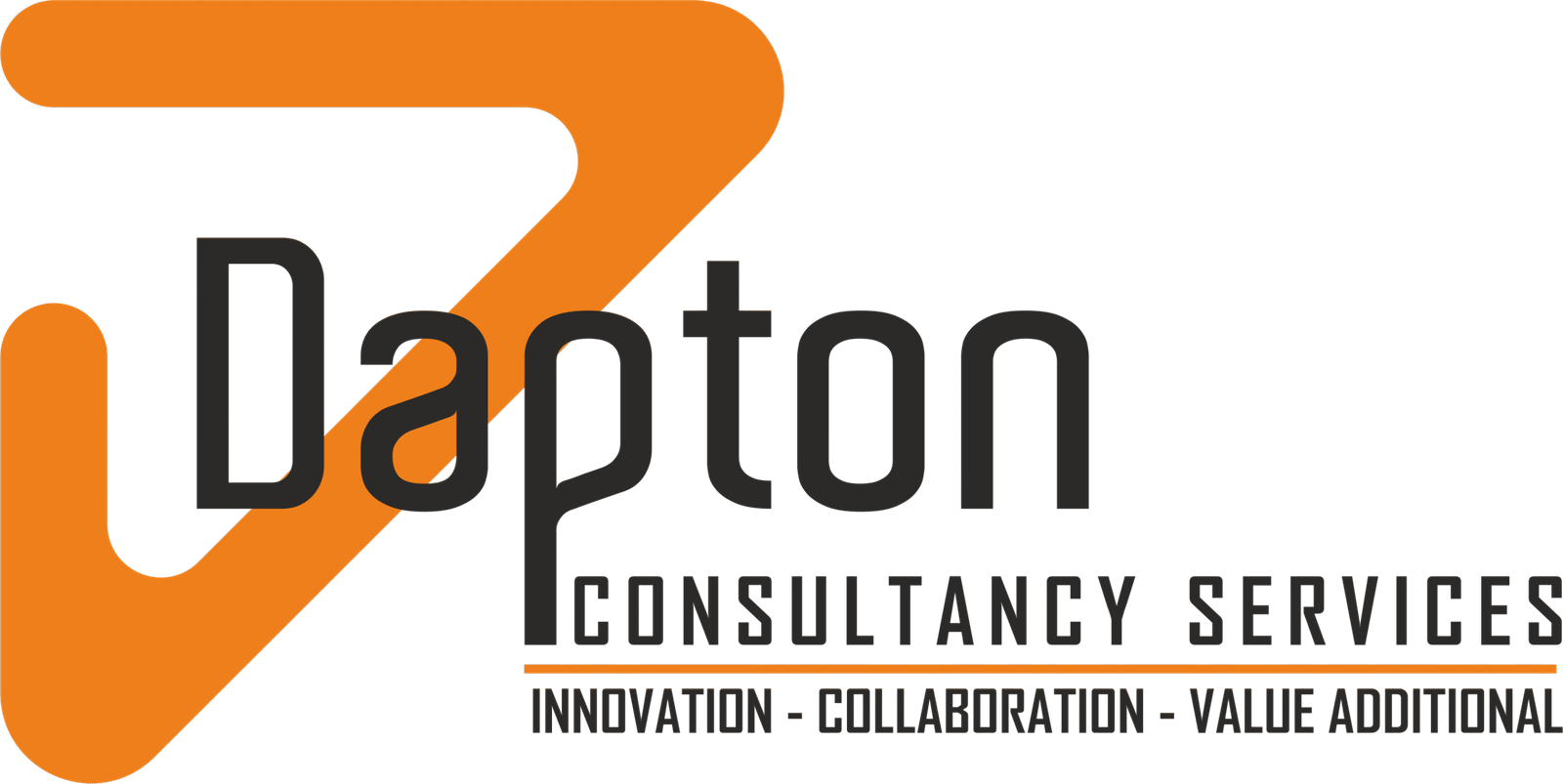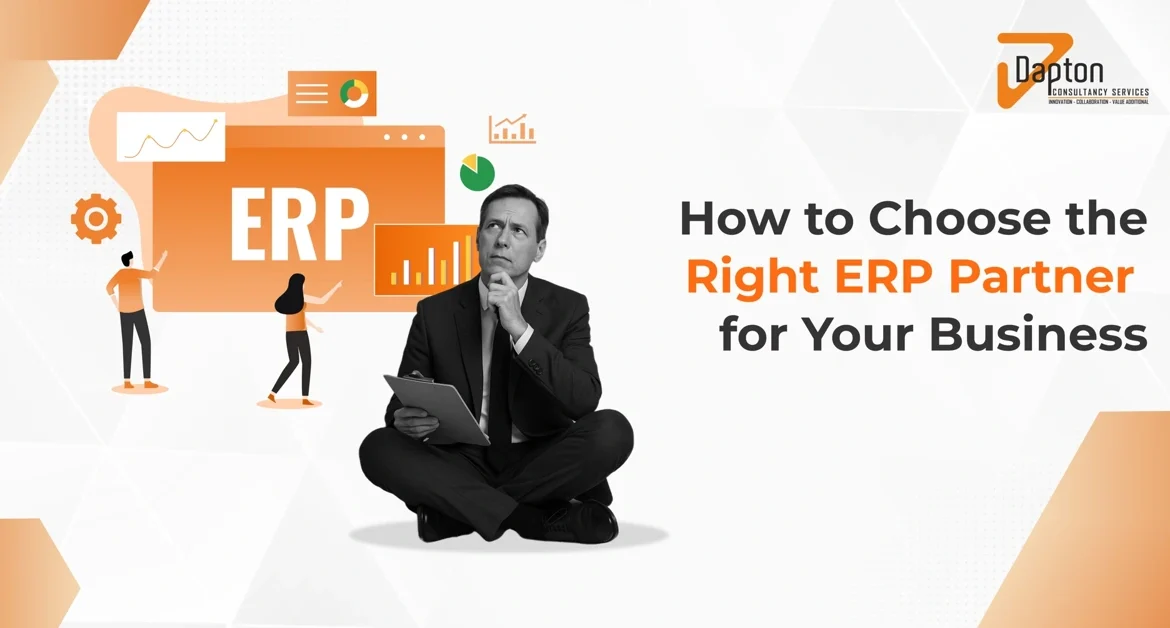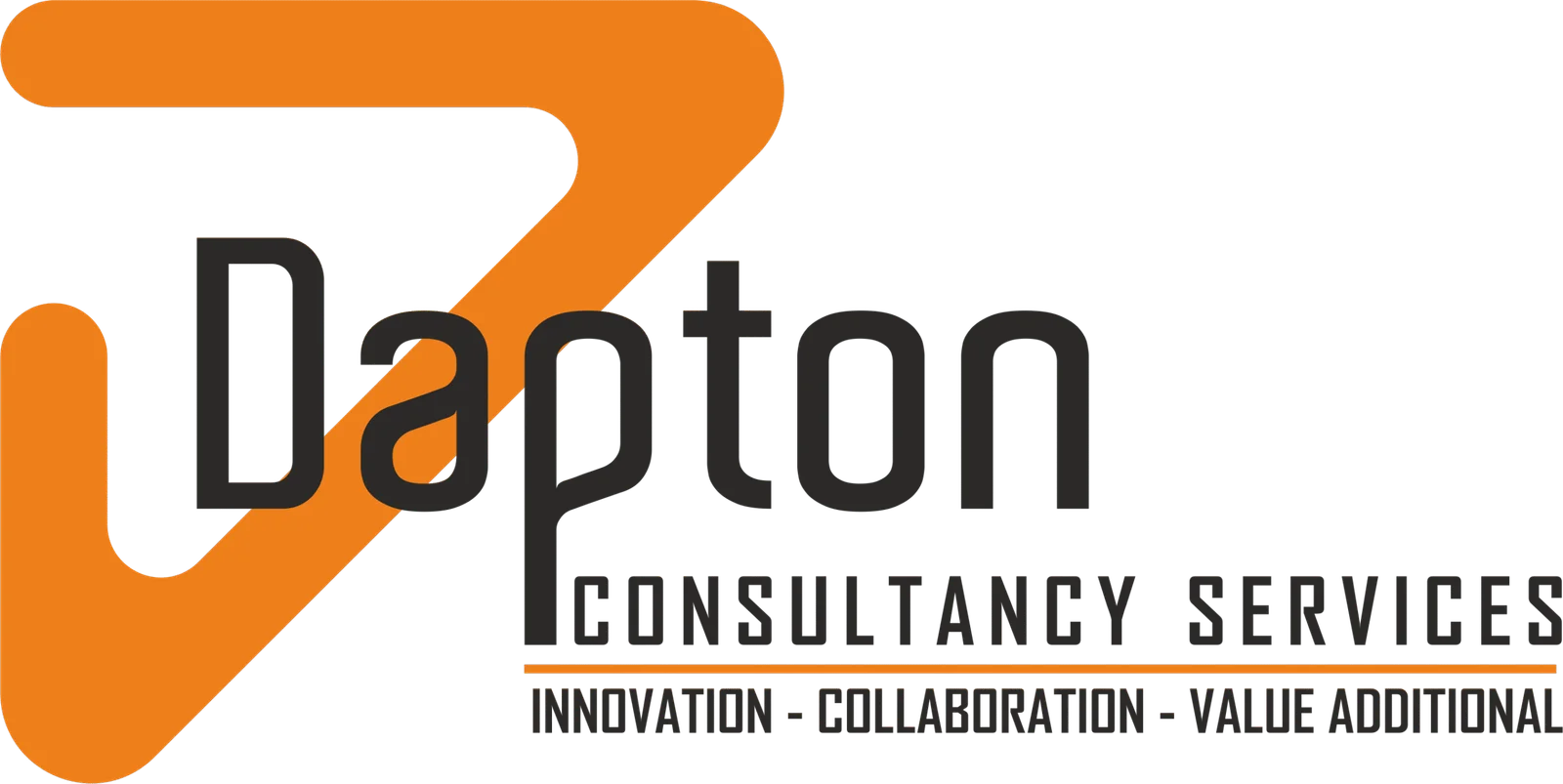Enterprise Resource Planning (ERP) initiatives are often transformational – yet they are also risky. According to Gartner, around 55 to 75% of ERP implementations fail to meet expectations. This is due to misaligned goals, poor partner fit, or weak post-deployment support. So, selecting an ERP implementation partner is a crucial decision. Having a strong ERP implementation partner can amplify – ROI, accelerate business agility, and reduce long-term costs dramatically. In this blog, we will thoroughly explore how to choose an ERP partner. Choosing ERP implementation partner is about finding – a strategic ally who understands your – business DNA and technical vision. Here is what to prioritize –
Choosing ERP implementation partner is about finding – a strategic ally who understands your – business DNA and technical vision. Here is what to prioritize –
This format turns subjective impressions into actionable insights – and enables stakeholder consensus.
Why Right ERP Partner Selection Is Critical
Choosing ERP implementation partner is not just a technical decision – it is a strategic imperative. Here is why:Failure Statistics and Missed ROI BenchmarksERP projects are complex and unforgiving. Studies reveal how ERP implementation strategy, ERP ROI and cost factors impact an ERP project:- Around 55–75% of ERP implementations fall short of expected goals, often due to poor partner alignment.
- According to our industry analysis, organizations report ROI variability of 150–300% depending on how well the ERP partner understood business context and delivered value.
- Missteps in selection lead to cost overruns, delayed go-lives, and weak user adoption – directly impacting financial outcomes and competitiveness.
Strategic vs. Tactical Vendor Roles
Selecting an ERP implementation partner is challenging – as not all ERP partners are created equal:- Tactical vendors may focus on software installation or routine tasks.
- Strategic partners, by contrast, help shape business processes, future-proof infrastructure, and drive adoption across departments.
- A tactical fit might check boxes – but only a strategic partner aligns technology with long-term business outcomes.
Long-Term Business Impact and Scalability
ERP is not just a project; it is a long-haul transformation. The partner you choose affects:- Scalability: How well the system grows with your business needs
- Innovation readiness: Integration of AI, cloud-native platforms, and automation
- Operational resilience: Effective data handling, compliance coverage, and process agility
ERP Partner Selection Criteria: What to Look For
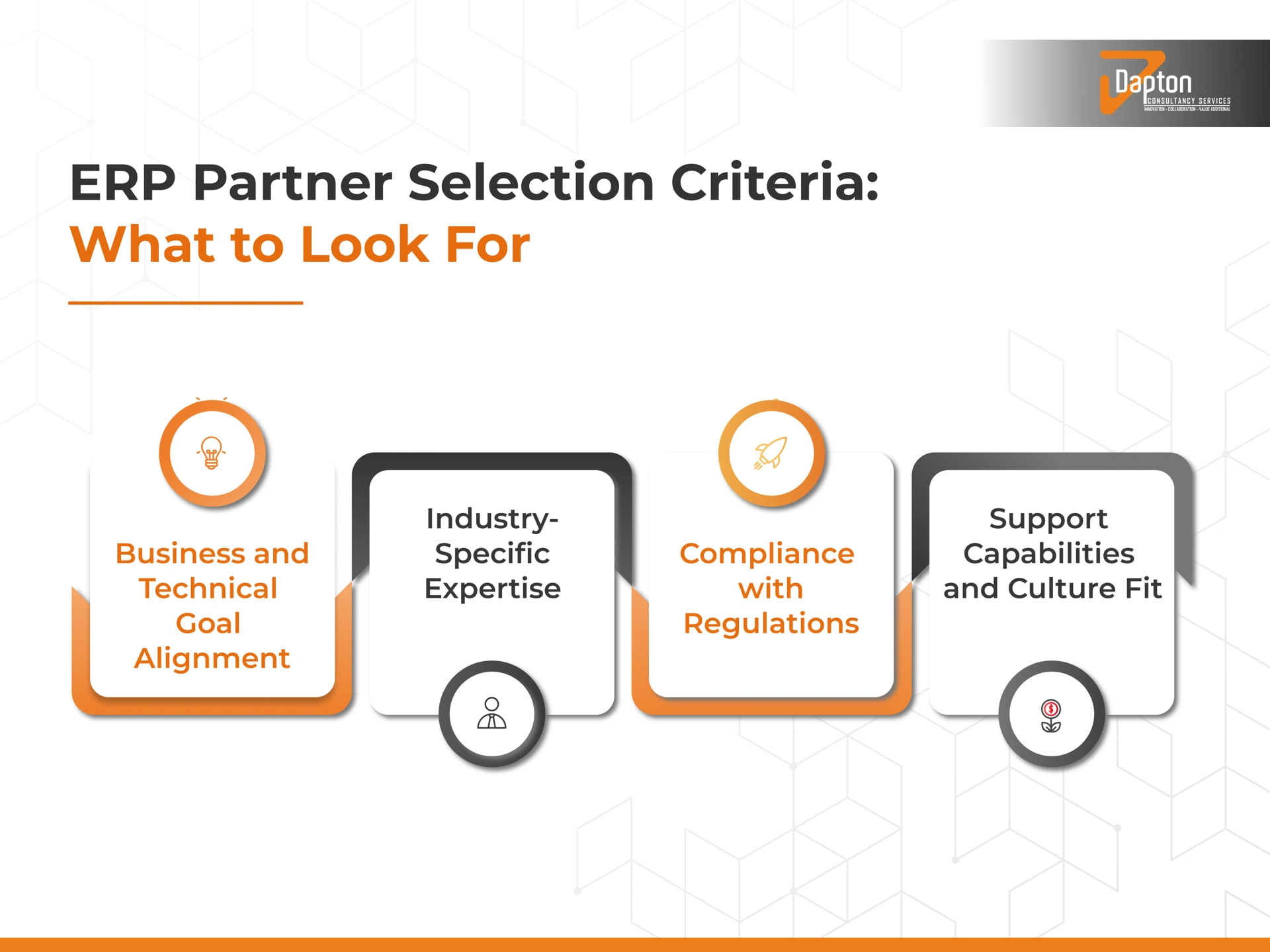 Choosing ERP implementation partner is about finding – a strategic ally who understands your – business DNA and technical vision. Here is what to prioritize –
Choosing ERP implementation partner is about finding – a strategic ally who understands your – business DNA and technical vision. Here is what to prioritize –Business and Technical Goal Alignment
The ideal ERP partner should –- Understand your long-term business objectives.
- Align with your technical infrastructure, data architecture, and integration needs.
- Offer scalable solutions that match your growth plans.
Industry-Specific Expertise
Generic ERP know-how will not suffice. Look for –- Deep experience in your vertical (e.g., manufacturing, retail, healthcare)
- Familiarity with sector-specific workflows and operational pain points
- Ability to demonstrate success stories in similar business contexts Industry fluency translates into faster implementation and fewer surprises.
Compliance with Regulations
The right ERP software development company should help you stay ahead of compliance risks. Depending on your region and industry, assess their expertise in:- GDPR (Europe), GST (India), HIPAA (healthcare), SOX (finance)
- Data privacy protocols and audit-readiness
- Regulatory change, adaptability and automated compliance reporting
Support Capabilities and Culture Fit
ERP is not just a tech upgrade – it is a collaborative journey. Prioritize partners who:- Offer robust, tiered support models and clear escalation paths
- Demonstrate empathy, responsiveness, and proactive communication
- Align with your company’s work culture and decision-making style
ERP Partner Evaluation Framework
Choosing the right ERP partner requires more than intuition — it demands a structured, objective process. An effective evaluation framework ensures – clarity, accountability, and stakeholder alignment – throughout the ERP partner selection process.Structured Decision-Making Matrix
Use a criteria-based matrix to assess – potential partners across business, technical, and strategic dimensions. Each partner is scored against predefined selection categories, like –- Functional and technical capabilities
- Industry relevance and compliance fluency
- Integration experience and architecture flexibility
- Support ecosystem and cultural compatibility
Weighted Scoring Model and Prioritization Tactics
Not all criteria carry equal weight. Customize weightings based on business priorities –- 40% for strategic alignment and scalability
- 25% for technical compatibility and future-readiness
- 20% for implementation methodology and support
- 15% for pricing transparency and SLA guarantees
Evaluation Table for Choosing an ERP Partner
| Evaluation Criteria | Weight (%) | Partner A | Partner B | Partner C |
|---|---|---|---|---|
| Strategic Fit & Business Goals | 40% | 4.0 | 3.5 | 4.5 |
| Technical Stack & Integration | 25% | 4.5 | 4.0 | 3.5 |
| Implementation Methodology & Support | 20% | 4.0 | 3.0 | 4.0 |
| Pricing & SLA Transparency | 15% | 3.5 | 4.0 | 3.0 |
| Total Weighted Score | – | 4.05 | 3.65 | 3.95 |
Custom ERP Partner vs. Off-the-Shelf Vendor
Choosing between a custom ERP partner vs off-the-shelf vendor depends on your organization’s scale, complexity, and long-term tech strategy. Here is how they stack up –Pros and Cons of ERP Vendor Comparison
| Feature | Custom ERP Partner | Off-the-Shelf ERP Vendor |
|---|---|---|
| Scalability | Highly scalable and tailored to growth paths | Limited scalability; may require add-ons |
| Flexibility | Fully customizable workflows & UI | Fixed modules; minimal customization |
| Implementation Time | Longer due to tailored development | Faster setup with predefined modules |
| Cost-Efficiency (long-term) | Higher upfront; better ROI over time | Lower upfront; potential hidden upgrade costs |
| Integration | Seamless with existing systems | May require middleware or workarounds |
| Support & Maintenance | Dedicated team with deep system knowledge | Standard support tiers; vendor dependent |
| Innovation Readiness | Aligned with your roadmap (AI, IoT, etc.) | May lag in emerging tech adoption |
- Fit for Scalability, Flexibility, and Cost-Efficiency
- Custom ERP shines for businesses with – unique workflows, regional compliance demands, or aggressive innovation goals. It’s ideal when long-term adaptability outweighs upfront costs.
- Off-the-shelf ERP is a smart choice for SMBs needing rapid deployment, standardized workflows, or limited IT overhead. It works well where flexibility isn’t mission-critical.
- Use Case Examples to Choose an ERP Partner
Custom ERP Partner
- A multinational manufacturing company is implementing plant-specific workflows and predictive maintenance powered by IoT.
- A healthcare provider needs HIPAA-compliant data handling, multilingual portals, and AI-enabled diagnostics integration.
Off-the-Shelf ERP Vendor
- A retail startup using standard inventory, billing, and GST features with minimal customization.
- A services firm adopting a plug-and-play solution for time tracking and basic CRM with fast onboarding.
ERP Implementation Partner Checklist
An ERP implementation is only as successful as the partner steering it. Use this strategic checklist to vet potential collaborators with precision and confidence.Strategic Alignment
- Has the partner mapped their approach to your short-term and long-term goals?
- Do they understand your business model, scalability needs, and desired ROI benchmarks?
- Are KPIs and success metrics jointly defined up front?
Technical Compatibility
- Does their platform support your infrastructure (cloud, hybrid, on-prem)?
- Can they integrate smoothly with existing apps, APIs, and custom tools?
- Is their tech stack future-proof?
- Are they ready for AI, analytics, and modular add-ons?
Data Migration Strategy
- Is there a clear roadmap for – migrating data from legacy systems?
- Do they offer – cleansing, validation, and mapping protocols?
- What precautions are in place for minimizing downtime or loss?
Communication Style
- Are their teams responsive, clear, and transparent in collaboration?
- Do their workflows match your internal rhythm (e.g., Agile, weekly scrums)?
- Is the time zone, escalation paths, and feedback channels well aligned?
Post-Implementation Support
- What does ongoing support look like – tiered help desk, escalation matrix, 24/7 availability?
- Do they offer training, documentation, and user adoption coaching?
- Can they scale support as your ERP ecosystem grows?
ERP Vendor Selection Best Practices
Choosing the right ERP vendor is more than a procurement task – it is a defining moment for long-term digital transformation. Here is how to navigate the ERP partner landscape with precision –How to Find the Right ERP Vendor!
- Start by clarifying business goals and functional priorities (e.g., finance automation, CRM, inventory control).
- Shortlist vendors based on industry alignment, platform capabilities, and integration readiness.
- Look beyond glossy demos: ask for architecture walkthroughs, sandbox access, or proof-of-concept trials.
- Consider third-party reviews, analyst reports, and peer benchmarks for validation.
Real-World Selection Mistakes to Avoid!
- Ignoring end-user feedback: Leads to poor adoption and resistance.
- Over-prioritizing cost: A low initial price can mask long-term inefficiencies.
- Undervaluing post-implementation support: Results in unresolved issues and operational bottlenecks.
- Failing to assess cultural compatibility: Misaligned communication styles can derail projects.
Reference Checks & Proof-of-Value Requests
Before signing the dotted line, validate your vendor’s performance through –- Client references from similar industries and project sizes
- Real-world case studies of the vendor with quantifiable KPIs (ROI, timeline, adoption rate)
- Vendor-agnostic comparisons showing competitive differentiators
- Project retrospectives – the good, the bad, and how issues were resolved
Sample ERP Partner Questionnaire
Equip your team with targeted questions to uncover real capabilities:| Category | Sample Questions |
|---|---|
| Strategic Alignment | “How do you tailor your solution to different business models?” |
| Technical Compatibility | “Can you walk us through your – API and third-party integration strategy?” |
| Data Migration | “What are your steps for mapping legacy data into your ERP system?” |
| Compliance | “What frameworks do you support (e.g., GDPR, GST, HIPAA)? How are updates handled?” |
| Support & Training | “What post-go-live training formats do you offer?” |
| Pricing Transparency | “Can you outline your fixed vs. variable pricing structure and potential hidden costs?” |
| Cultural Fit | “How do you ensure smooth collaboration across remote teams and time zones?” |
Conclusion: Make Your ERP Partner Count!
Choosing the right ERP implementation partner is no longer optional – it is mission-critical. The wrong fit can stall innovation, inflate costs, and derail adoption. But the right partner can unlock operational agility, long-term ROI, and scalable transformation. So, prioritize and select ERP vendors that understand your business goals and tech vision.Partner with Dapton Consultancy Services to empower your business with robust and scalable ERP solutions. Whether you are optimizing operations, enhancing compliance, or enabling digital transformation – Dapton delivers strategic ERP implementations aligned with your long-term vision.
How long does ERP partner selection typically take?
ERP partner selection typically spans 2 to 5 months – though timelines vary based on project scope and internal readiness. Here is a breakdown of influencing factors –
- Stakeholder Alignment (2–3 weeks)
- Requirements Gathering & Vendor Research (3–4 weeks)
- Evaluation & Scoring (4–6 weeks)
- Final Decision & Contracting (2–4 weeks)
What is a typical ROI timeframe post-deployment?
Organizations typically begin to realize meaningful ERP ROI within 12 to 18 months of go-live, but this depends heavily on deployment quality, user adoption, and automation maturity.
- Process Optimization ROI (6–9 months)
- Data Visibility ROI (9–12 months)
- Automation-Driven ROI (6–12 months)
- Strategic ROI (12–18+ months)
How does an ERP partner align your system with a long-term strategy?
A strategic ERP partner aligns the system with long-term goals by tailoring processes, architecture, and KPIs to support business scalability. They design modular, future-ready solutions that evolve with your organization and provide ongoing optimization to ensure the ERP system remains a catalyst for transformation.
